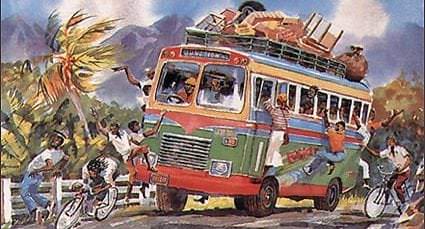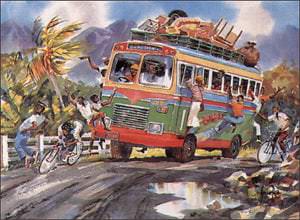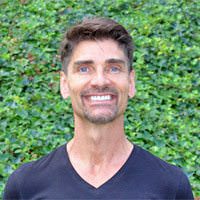Living in Solidarity With The Poor: Who? How? What? Why?

Editors Note: Missioner Tim Shelgren articulates the lessons learned from living simply with people experiencing poverty in Kingston, Jamaica.
Solidarity
Almost five years ago now I bought a camper and moved to Prescott, Arizona. Living there in the camper for three years, I met other people who also lived in campers, tents, and even old Volkswagen vans. Many of these people were different from me. They were from a difficult socioeconomic position. Regardless, I fell in love with many of them.
My newfound recognition that the ‘lesser’ are actually ‘equal’ brought to me an interest in reading Fr. Richard Rohr and St. Francis. I was drawn to their teaching that we are all one body in Christ, and that a lifestyle of caring for others will transform us. Though, a Protestant Christian my whole life prior, I decided when I left Arizona to explore Catholicism, hoping to find like-minded people there. In State College, PA, I took one year of RCIA classes at Good Shepard Church and became a member of the Catholic Church. In that year, I attended a class every Thursday morning with a group of people who were studying the ways of St. Francis. In our teaching DVDs, Fr. Daniel P. Horan, O.F.M. used the phrase “living in solidarity with the poor” a lot. I wondered if he was referring to a similar experience to the one I had in Arizona. He was never exactly precise on a definition.
How?
In an all-out attempt to come up with my own definition of “solidarity,” I applied to Franciscan
Mission Service. As I answered the detailed application questions, I reflected on Christ’s words in
Mathew 4:19-20, “Follow me, and I will make you fishers of men.” “Immediately they left their nets and
followed him.”
FMS accepted me. First, I chose to rid myself of all my belongings—except for my top-of-the-line bicycle, which was stolen while in DC for FMS Formation. With that robbery, I came to believe that God wanted me to have nothing, to be raw in my humanness with no possessions.
Now in Kingston, Jamaica for only seven months, life has become even more raw. Verbal communication is extremely challenging as the Jamaican-English accent is unfamiliar to my ears, and the Patois language is 90% unrecognizable to me. The heat is exhausting, and the unpredictability of what the day will bring as a missioner is hard to accept. U.S. Americans… we are structured and organized.
What to do?
I have had no choice but to surrender to all of the above. And here is the result: In that surrender, I am assimilating into a whole new way of be-ing. I’ll share an example.
Yesterday, on the way home from a phonics class I am currently teaching at St. Francis Primary School, a little boy plopped himself down beside me on the coaster bus. He was as sweaty and tired as I was. Both of us slumped in our seats, looking out the dirty window and quietly listening to the non-stop hum of the inner city. I said, “Do you want to play a game?” He did, and I took out the paper tablet I use for the game “Riddle Me This” in my reading class. After five minutes of playing, another boy across the aisle started to curiously join in.

Painting by Jamaican born Herbie Rose
Bus rides in Kingston are long, and we played for a good half hour. In that time all three of us learned a lot. I learned who the boys were in personality, what made them laugh, and I even got a sense of their intellectual strengths and differences. And they found out that white and black people have much in common—like personality, laughter, and smarts. After the boys jumped off at their stops, I recognized that in my pre-missioner life, I could never have enjoyed that thirty-minute bus ride the way I did yesterday. I was above sweaty, loud, dirty buses. Now, I am not.
By shedding my old life—and in surrendering to the new—I am now able to be present, as St. Francis would say. Or I am able to be in-the-now, as Richard Rohr would say. In that now on the bus, I was fully engaged with two Jamaican boys on their turf, in the middle of their day. For a half hour, I existed in true solidarity with them. And I was comfortable, happy, and thankful to do so.
Why?
As a missioner in a foreign land, God is giving me numerous experiences and stories like the one I tell here. And in each experience, I feel those same feelings of comfort, happiness, and gratitude. I ask myself, “Why does living in solidarity with people experiencing poverty feel so good?”
One of the main reasons, for me, has to do with what I have sacrificed. I not only gave up my possessions in preparation for mission, I also gave up (temporarily) my career and steady income. Though this decision leaves me feeling frightened, and even humiliated at times, I also feel the pressure is off. With nothing to lose, I am free—free from my typical high level of concern for self.
In that freedom, I am able to appreciate and enjoy spending time with people who live on the margins. I am able to practice the way of St. Francis, the way of Jesus the Christ. Rohr teaches that one of God’s main reasons for incarnating as human was to show us how to selflessly spend time with and care for the marginalized, how to “be human.” To be human in God’s way, as I am discovering, feels good.
Moreover, Christ is clearly supporting me in my attempts to follow him. Sharing in Christian community, I have shelter and my survival needs are met. And my psychological, emotional, and physical states are healthy. All the variables are in place to fully immerse into the practice of living in solidarity with the poor. I am thankful and glad to have changed my life.
To close, I encourage you to explore this notion of change. St. Francis made a radical change when he went to Assisi’s town square, stripped naked, and publicly denounced the ways of the world. Soon after, his entire life and being were transformed. Though change and transformation for us may never be as extreme, we can take one step at a time deeper into the lifestyle. Extreme enough for me, we can choose to make sacrifices, find freedom, and practice being human in God’s way. There it is–solidarity defined.
Reflection Question: What are some simple changes you can make in your own life to better reflect the life of St. Francis?
Tagged in:

